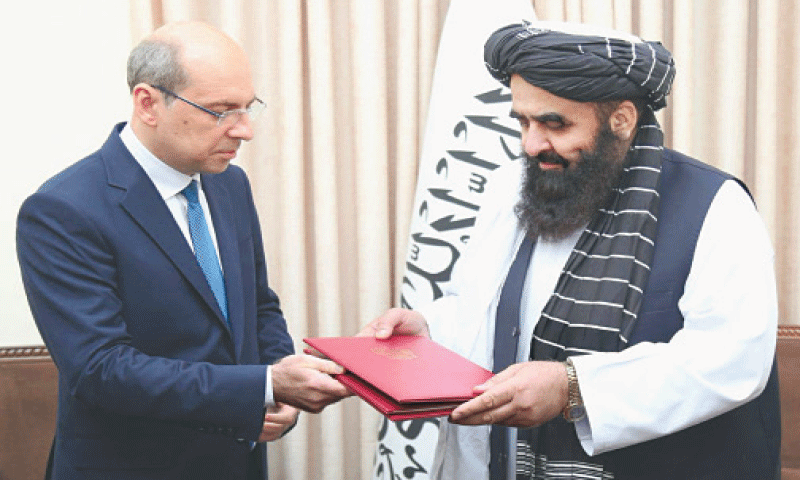Experts believe Moscow’s groundwork to engage with the Afghan Taliban is born out of its security and geopolitical concerns.
• Experts say Moscow’s decision reflects desire to prevent Afghanistan from falling back into US camp
• Move ‘unlikely to ease path’ for wider global recognition of Afghan Taliban regime
ON July 3, Russia recognised the Taliban government of Afghanistan, becoming the first country to recognise the regime in Kabul, which came to power in August 2021.
At the time, Moscow had said that its decision would “give an impetus” to bilateral cooperation between the two countries.
But Russia has been laying the groundwork to engage with the Afghan Taliban for more than a decade, even when they weren’t in power — a move, experts believe, is born out of Moscow’s security and geopolitical concerns.
In 2015-16, the Russians set up formal engagement channels with the Taliban.
According to a Taliban official, members of the group’s political office had carried out secret visits to Russia.
The Russians not only maintained a steady engagement with the Afghan Taliban after the takeover in August 2021, but have been advising them on taking measures to improve governance, counter-terrorism and human rights to pave the way for their mainstreaming and recognition.
Mansoor Ahmad Khan, Pakistan’s former ambassador in Kabul, said Russia’s decision was the culmination of a systematic process where the country first engaged the Taliban for twelve years.
Then it launched the ‘Moscow Format’ forum and included the Afghan Taliban in it.
Terrorism and extremism
According to experts, Russia wants a stable government in Afghanistan — following the withdrawal of US and Nato forces — that could act against terrorist outfits, particularly the militant IS-Khorasan’s, the trade of narcotics, and stop the spread of religious extremism and radicalism into Central Asian countries.
It also wants to stop Afghanistan from getting closer to the US and its Western allies.
Dr Sher Hassan Hassan, a Moscow-based Afghan political analyst, said Russia does not want Afghanistan to fall into the hands of the Americans or the West again.
He said all countries, especially major powers, were “trying to protect their national interests and security by at least preventing Afghanistan from being used against them”.
“The US is also working for this goal,” Mr Hassan said, adding the Russians are “concerned about this approach” and making efforts to keep Americans and their allies away from the Taliban.
“Russia would not want to see them [the US] have military bases in Afghanistan or deploy strategic weapons,” Dr Hasan said, adding it would pose a danger to Russia’s security.
At the same time, Moscow also wants to protect its partners in Central Asia from terrorists and their ideology out of fear for its national security.
“If terrorist ideologies grow or develop in Central Asia and from there, the menace spreads to Russia, then Russia will suffer a lot in this and will not be able to prevent it,” Dr Hassan added.
The Central Asian countries, a geographic buffer between Russia and Afghanistan, have, despite their reservations with the Taliban government, adopted a conciliatory approach of strengthening economic and infrastructure linkages to promote regional connectivity with Afghanistan and South Asia.
According to Dr Ubaidullah Burhani, an American academic of Afghan origin, Russia’s decision to recognise the Taliban government is more than a symbolic gesture.
“It is a deliberate geopolitical manoeuvre intended to distance the movement from US influence and to contain the spread of extremist groups into Central Asia,” said Dr Burhani, a researcher in political strategy and a specialist in international affairs.
He said the recognition offered the Taliban an opportunity to reevaluate their governance approach, particularly for the formation of an inclusive political system, lifting restrictions on girls’ education and upholding fundamental human rights.
The development, Dr Burhani believes, has “disrupted the prevailing stagnation within Afghanistan”, where neither substantive reforms nor credible opposition forces have emerged.
Opposition
The Russian decision has been condemned by anti-Taliban opposition leaders, who have shunned their differences to offer a rare unity in condemning the move.
They said the decision was a “dangerous game” and expressed fears of a new phase of geopolitical rivalry among global and regional powers over Afghanistan.
The anti-Taliban National Resistance Front (NRF) of Afghanistan, led by Ahmad Shah Masoud, condemned the Russian decision and said the decision to recognise the Taliban constituted a “significant advantage for the terrorist partners of this group and the criminal networks” in Afghanistan.
“Creating an international escape route to rescue the illegitimate Taliban regime not only fails to contribute to regional stability, security, and development but also leads to the normalisation of terrorism and criminal economy, endorsement of extremism, and encouragement of drug and arms trafficking,” the NRF said in a statement on July 4.
Wider global recognition
The next step for the Kabul regime would be a wider global recognition, particularly by the Western nations and a seat at the UN.
According Mr Khan, the former Pakistan ambassador, the Russian recognition was a part of the “ongoing process of gradual expansion of Afghanistan’s engagement with other countries”.
“However, further progress in Afghanistan under the Taliban in moving towards universal recognition is a more complex geo-political phenomenon,” Mr Khan told Dawn.
Another hurdle to global recognition for Kabul is the presence of the Taliban and its leaders on global terror lists.
For Kabul to get a seat at the UN and other global organisations, like the OIC, would require the de-listing of the Taliban and its leaders from the UN sanctions and monitoring committees, as well as the lifting of economic and banking sanctions by major Western powers.
Afghan Taliban’s own actions — or inactions — have not helped speed up the global recognition.
The absence of an inclusive governance system and restrictions on human rights, particularly women’s rights, have antagonised the foreign powers.
Published in Dawn, July 12th, 2025
